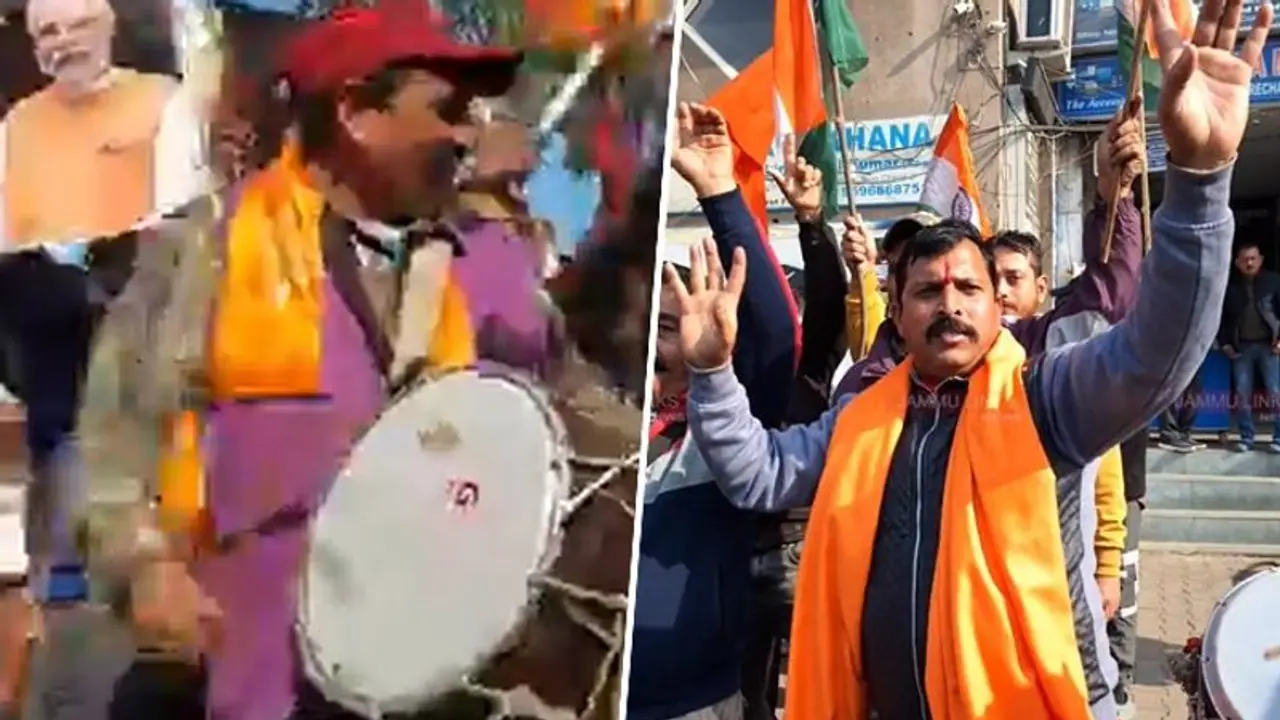Celebrations erupted across Jammu and Kashmir after the Supreme Court on Monday unanimously upheld the Centre's decision to abrogate provisions of Article 370 bestowing special status to the erstwhile state.
In a historic ruling on Monday, the Supreme Court unanimously affirmed the Centre's decision to revoke the provisions of Article 370, which granted special status to the former state of Jammu and Kashmir. The court, led by Chief Justice D Y Chandrachud, directed the prompt restoration of statehood and the scheduling of assembly elections by September 30 of the following year.

Putting an end to a prolonged debate, the five-judge Constitution bench provided three concurring judgments supporting the annulment of the constitutional provisions that conferred special status on Jammu and Kashmir upon its integration with the Union of India in 1947. Following this historic judgement, celebrations erupted in Jammu and Kashmir as people danced to drum beats and distributed sweets.
In authoring the judgment on behalf of himself and Justices B R Gavai and Surya Kant, Chief Justice Chandrachud underscored that Article 370 was intended as a temporary provision, and in the absence of the Constituent Assembly of the former state, the president possessed the authority to revoke it.
The Supreme Court decision is poised to provide a substantial political advantage to Prime Minister Narendra Modi and the Bharatiya Janata Party in the lead-up to the 2024 Lok Sabha elections. The revocation of Jammu and Kashmir's special status in August 2019, executed under Article 370 of the Constitution, occurred shortly after the BJP secured a landslide victory in the elections, with the prime minister fulfilling a significant electoral promise.
The Supreme Court was in the process of reviewing petitions that contested a set of legislative and executive measures aimed at eliminating the special status of the former state of Jammu and Kashmir, ultimately leading to its division into union territories, including Ladakh. Subsequent to these changes, the Jammu and Kashmir administration imposed restrictions on the movement of people, imposed limitations on internet connectivity, and detained local political leaders.
Chief Justice of India Chandrachud, while delivering the judgment, emphasized that each decision made by the Centre under proclamation on behalf of a state should not be susceptible to legal challenges. He argued that subjecting such decisions to legal scrutiny could impede the administration of the state and bring it to a standstill.
"The proclamation of Maharaja stated that the Constitution of India will supersede. With this, the para of Instrument of Accession ceases to exist....Article 370 was an interim arrangement due to war conditions in the State. Textual reading also indicates that Article 370 is a temporary provision," the court said.
The court further noted that the contention put forth by the petitioners, asserting that the Union government cannot enact measures of irreversible consequences in the state during Presidential rule, was deemed unacceptable.
"We have held that the state of Jammu and Kashmir did not retain an element of sovereignty when it joined the Union of India. We have arrived at this conclusion for the following reasons. First paragraph eight of the instrument of acession executed by Maharaja Hari Singh provided that nothing in the instrument would affect the continuance of the sovereignty of the Maharaja in and over the state," CJI Chandrachud said.
The Chief Justice of India (CJI) additionally observed that a proclamation for the State of Jammu and Kashmir was issued by "Yuvraj Karan Singh" on November 25, 1949.
"The declaration on this proclamation, that the Constitution of India would not only supersede all other constitutional provisions in the state, which were inconsistent with it, but also abrogate them, achieves what could have been attained by an agreement of merger. With the issuance of the proclamation, paragraph of the instrument of acession ceases to be of legal consequence. The proclamation reflects the full and final surrender of sovereignty by Jammu and Kashmir through its sovereign ruler to India " the CJI added.
The Supreme Court said, "The declaration issued by the President exercises the power and clause 3 of Article 370 is a culmination of the process of integration. Thus, we do not find that the President's exercise of power under Clause 3 of Article 370 was malafide. We hold the exercise of Presidential Power to be valid."
The court also emphasized that Article 370 was designed for the Constitutional integration of Jammu and Kashmir with the Union, with its intent being integration rather than disintegration. Furthermore, it underscored that the President has the authority to declare the cessation of Article 370.
"Concurrence of the State government was not required to apply all provisions of the Constitution using Article 370(1)(d). So, the President of India taking the concurrence of the Union government was not malafide," the court noted.
On September 5, the highest court had reserved its judgment after a 16-day hearing of arguments. The Central government defended its decision to revoke Article 370, asserting that there was no "constitutional fraud" in nullifying the provision that granted special status to the former state of Jammu and Kashmir.
Representing the Centre, Attorney General R Venkataramani and Solicitor General Tushar Mehta presented their case.
Senior advocate Kapil Sibal, appearing on behalf of the petitioners, initiated the arguments by contending that Article 370 had ceased to be a "temporary provision" and had acquired permanence following the dissolution of the Constituent Assembly of Jammu and Kashmir.
